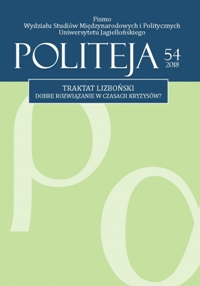Artykuły członków zespołu JMC EUCRIS w specjalnym numerze "Politei"

Informujemy, że w najnowszym specjalnym numerze "Politei" (2018, nr 54) ukazały się trzy artykuły naukowe członków zespołu JMC EUCRIS:
- Janusz Węc, Reforma wspólnej polityki bezpieczeństwa i obrony Unii Europejskiej w latach 2016-2017;
- Agnieszka Nitszke, Europejska Służba Działań Zewnętrznych – nowa jakość dyplomacji unijnej?;
- Adam Kirpsza, Evaluating the impact of the Lisbon Treaty on the European Union’s legislative productivity.
Specjalny numer "Politei" zawiera najlepsze wystąpienia oraz artykuły zaprezentowane w czasie konferencji "Traktat lizboński. Dobre rozwiązanie w czasach kryzysów?", która odbyła się w ramach projektu JMC EUCRIS w dniach 13-14 grudnia 2017 r. Wszystkie artykuły są w otwartym dostępie. Zachęcamy do przeczytania.
Abstrakty:
J. Węc, Reforma wspólnej polityki bezpieczeństwa i obrony Unii Europejskiej w latach 2016-2017
The subject of the article is the reform of the Common Security and Defence Policy in 2016‑2017 following the adoption of the new EU External Security Strategy by the European Council in June 2016. The first part of the article analyzes the European Union’s Global Strategy on Foreign and Security Policy. However, the second part of the article reconstructs the process of implementing the global strategy and describes the successes and failures of the reform.
A. Nitszke, Europejska Służba Działań Zewnętrznych – nowa jakość dyplomacji unijnej?
The European External Action Service (EEAS) was established based on the Treaty of Lisbon. The objective of the creation of the EEAS was to increase the role of the European Union in the international arena and increase the effectiveness of the Union’s external actions. The aim of the article is to discuss the international position of the Union and its international roles, and then to present the legal foundations of the EEAS. The next part analyzes changes in the functioning of the EEAS undertaken by both high representatives – Catherine Ashton and Federica Mogherini. In conclusion, an attempt was made to answer the question of whether the European Union needs autonomous diplomacy and whether the EEAS can be treated as EU diplomacy.
A. Kirpsza, Evaluating the impact of the Lisbon Treaty on the European Union’s legislative productivity.
The purpose of this article is to analyze whether the Treaty of Lisbon provisions have – as expected – increased the EU legislative productivity. To this end, the author tests the hypothesis that the TL has increased the number of legislative proposals submitted by the European Commission under the ordinary legislative procedure. This expectation is verified using a negative binomial regression on a dataset containing 1116 draft acts proposed by the Commission in 2004‑2014. The analysis shows that, contrary to expectations, the Treaty of Lisbon has not led to a visible increase in EU legislative productivity. Despite the extension of treaty bases envisaging the OLP and QMV, the number of proposals submitted under this procedure after the entry into force of the TL remained more or less at the same level as before. In addition, the study reveals that adaptation, anticipation of future enlargement, closeness to the end of the EP term as well as annual schedule of legislative work are key predictors of the Commission’s productivity.
Osoba publikująca: Adam Kirpsza
